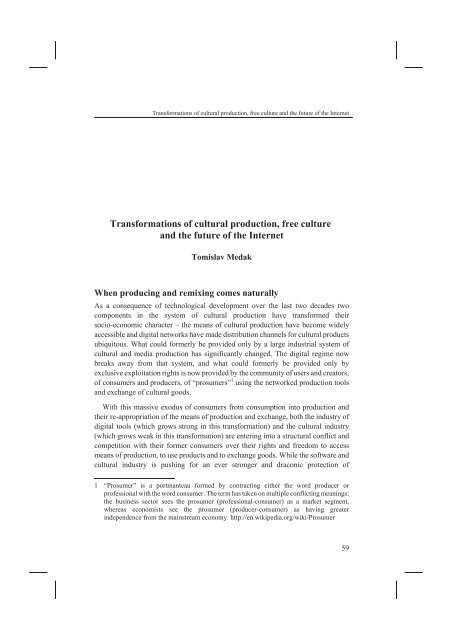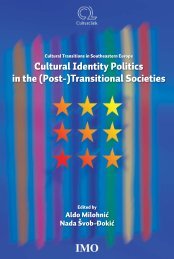D:\Documents and Settings\Ana\My Documents\Biserka-knjiga ...
D:\Documents and Settings\Ana\My Documents\Biserka-knjiga ...
D:\Documents and Settings\Ana\My Documents\Biserka-knjiga ...
You also want an ePaper? Increase the reach of your titles
YUMPU automatically turns print PDFs into web optimized ePapers that Google loves.
Transformations of cultural production, free culture <strong>and</strong> the future of the Internet<br />
Transformations of cultural production, free culture<br />
<strong>and</strong> the future of the Internet<br />
Tomislav Medak<br />
When producing <strong>and</strong> remixing comes naturally<br />
As a consequence of technological development over the last two decades two<br />
components in the system of cultural production have transformed their<br />
socio-economic character – the means of cultural production have become widely<br />
accessible <strong>and</strong> digital networks have made distribution channels for cultural products<br />
ubiquitous. What could formerly be provided only by a large industrial system of<br />
cultural <strong>and</strong> media production has significantly changed. The digital regime now<br />
breaks away from that system, <strong>and</strong> what could formerly be provided only by<br />
exclusive exploitation rights is now provided by the community of users <strong>and</strong> creators,<br />
of consumers <strong>and</strong> producers, of “prosumers” 1 using the networked production tools<br />
<strong>and</strong> exchange of cultural goods.<br />
With this massive exodus of consumers from consumption into production <strong>and</strong><br />
their re-appropriation of the means of production <strong>and</strong> exchange, both the industry of<br />
digital tools (which grows strong in this transformation) <strong>and</strong> the cultural industry<br />
(which grows weak in this transformation) are entering into a structural conflict <strong>and</strong><br />
competition with their former consumers over their rights <strong>and</strong> freedom to access<br />
means of production, to use products <strong>and</strong> to exchange goods. While the software <strong>and</strong><br />
cultural industry is pushing for an ever stronger <strong>and</strong> draconic protection of<br />
1 “Prosumer” is a portmanteau formed by contracting either the word producer or<br />
professional with the word consumer. The term has taken on multiple conflicting meanings:<br />
the business sector sees the prosumer (professional-consumer) as a market segment,<br />
whereas economists see the prosumer (producer-consumer) as having greater<br />
independence from the mainstream economy. http://en.wikipedia.org/wiki/Prosumer<br />
59



